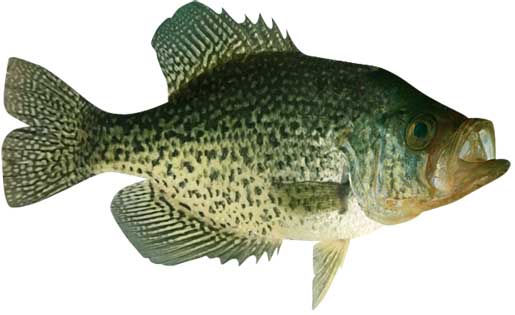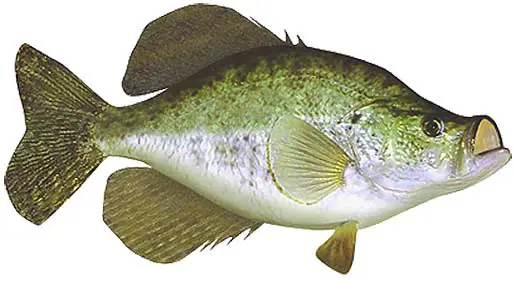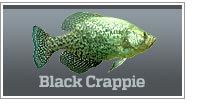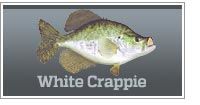Crappie Fishing In Kansas
Guide to catching white and black crappie
Last updated on .
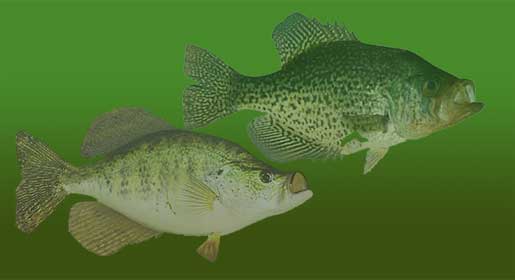
How To Fish For Crappie In Kansas
Crappie, esteemed for their delectable flesh and spirited fights, present an enticing challenge for anglers of all experience levels. These schooling fish offer an array of opportunities for catching crappie throughout the year. Understanding their habits and preferred environments is key to success. Many Kansas lakes offer both black crappie and white crappie. Ice fishing for crappie can be very enjoyable, and a great way to entertain kids.
Crappie Fishing Video
Best Way To Catch Crappie
Use light tackle, with 4 to 6-pound line and small hooks (#2 or #4) for live bait. Small crappie jigs are also productive and come in a wide range of colors to work in varied water clarity. Experiment with colors until you find the one that works best that day. For drifting or trolling, 1.2 miles per hour seems to be an ideal starting point. For jigging, experiment with very slow, to aggressive action.
Crappie Fishing Options
Fishing For Black Crappie
Black crappie, also known as specks, are typically found in deeper, cooler waters. They are known for their distinctive black mottled patterns and their preference for submerged vegetation or woody cover. Anglers targeting black crappie often use techniques such as vertical jigging, casting with small jigs or minnow imitations, or fishing with live bait near structures. The current Kansas state record for black crappie stands at over 4 pounds
Fishing For White Crappie
White crappie, also known as silver perch, are known for their silvery coloration and vertical stripes. They are more tolerant of warm water and can be found in shallower areas with less cover. White crappie are often found near submerged brush, fallen trees, or rocky shorelines. Anglers targeting white crappie in Kansas lakes often use similar techniques as with black crappie, such as jigging or using live bait. The current Kansas state record for white crappie is over 4 pounds.
Locating Schools Of Crappie
Generally speaking, warm-water lakes with submerged brush create the ideal environment for crappie. In Kansas, Melvern Lake, Tuttle Creek Lake and El Dorado Lake are among the best opportunities for finding great crappie holes this year. Other lakes in the state also have nice populations of crappie. Using a fish finder is the best way to locate crappie. They tend to be school up near brush (or other cover), and tend to stack vertically on the fish finder screen. Without a fish finder, use the old-fashion method of trial and error in areas with submerged brush.
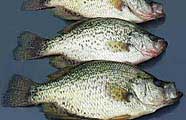 Spring emerges as the prime season for crappie enthusiasts in Kansas, as these cunning fish engage in their annual spawning runs. During this time, they exhibit heightened activity levels, making them more susceptible to angling efforts. Crappies are particularly fond of cover, seeking refuge among submerged brush, stumps, or artificial structures. These structures provide shelter and ambush points, making them ideal hunting grounds for crappie anglers.
Spring emerges as the prime season for crappie enthusiasts in Kansas, as these cunning fish engage in their annual spawning runs. During this time, they exhibit heightened activity levels, making them more susceptible to angling efforts. Crappies are particularly fond of cover, seeking refuge among submerged brush, stumps, or artificial structures. These structures provide shelter and ambush points, making them ideal hunting grounds for crappie anglers.
Top Crappie Fishing Techniques
Still-fishing, casting, trolling, and drifting are all viable methods for enticing these elusive fish. Each approach requires careful consideration of factors such as water depth, structure, and prevailing weather conditions. Anglers must adapt their tactics accordingly.
In the early hours of dawn, crappies often venture closer to the surface in search of prey. As the sun ascends in the sky, they gradually descend to depths of 5 to 10 feet or more, depending on water clarity and environmental variables. Midday finds them seeking refuge in deeper waters, often retreating to depths of 25 feet or beyond. However, as dusk approaches, crappies may once again ascend towards shallower water depths, drawn by the fading light and the promise of nocturnal feeding opportunities.
Night Fishing For Crappie
Fishing for crappie at night presents a particularly enticing prospect for crappie enthusiasts, with the cover of darkness often enhancing their feeding instincts. Warm-water lakes, in particular, offer fertile grounds for nocturnal angling excursions year round. Crappie fishing lights, strategically positioned to attract insects and smaller baitfish, can serve as beacons of opportunity for opportunistic crappies prowling in the darkness. Live minnows or crappie jigs are the top producers at night. At night, anchor over deeper water nearby brushy shorelines and allow the crappie lights to draw the fish to you.
Ice Fishing For Crappie
When the cold winter weather sets in and the lakes in Kansas freeze over, it's time to dig out the ice fishing gear. Crappie fishing through the ice can make a fun day for anglers of all ages. Visit the Kansas Ice Fishing page for details.
Bait For Crappie
When it comes to bait selection, crappies exhibit a voracious appetite for a variety of offerings. Live bait, especially minnows, are often the best bait for crappie. In addition, worms and crickets are perennial favorites among many anglers, enticing bites with their natural movements and scents. Artificial lures, including jigs, spinners, and soft plastics, also hold considerable appeal, mimicking the appearance and behavior of crappie's preferred prey.
Where To Find Crappie
As for the question of where to catch crappie, the answer lies in their penchant for structure and cover. Kansas lakes, ponds, rivers, and reservoirs all provide potential habitats for these versatile fish. Anglers should focus their efforts on areas with ample cover, such as submerged vegetation, fallen trees, and rocky outcrops. By carefully assessing the aquatic landscape and employing effective fishing techniques, anglers can unlock the secrets of crappie fishing and enjoy bountiful harvests year-round.
Best Crappie Fishing Lakes In The State
The best and most consistent stringers continue to come from larger lakes including Big Hill Lake, Cheney Reservoir, Clinton Lake, Coffey County Lake, Council Grove Lake, El Dorado Lake, Elk City Lake, Fall River Lake, Hillsdale Lake, John Redmond Reservoir, Kanopolis Lake, Keith Sebelius Lake, Kirwin Reservoir, La Cygne Lake, Lovewell Reservoir, Marion Reservoir, Melvern Lake, Milford Lake, Perry Lake, Pomona Lake, Toronto Lake, Tuttle Creek Lake, Waconda Lake, Wilson Lake, Winfield City Lake and Wolf Creek Reservoir.
Black crappie
world record: 6 lbs 0 oz
state record: 4.63 lbs
White crappie
world record: 5 lbs 3 oz
state record: 4.02 lbs
Click the images and links above for species details.
Top 5 crappie fishing lures
Crappie jigs work well in water from 2' to 40' deep, and are the most popular artificial lure for crappie ever. When crappie are shallow, spinners, small crankbaits and underspins are the often very productive. As they move deeper, spoons are among the top producers if the crappie are active. Review details for the best crappie rig options. Understanding the seasonal movements of crappie can enhance your chances of using these lures in the ideal locations.
Kansas State Record Crappie
The state record black crappie was caught from Woodson Lake.
The state record white crappie came out of a private pond.
 Crappie are actually a member of the sunfish family and can be found in many Kansas lakes. Crappie are known by many different local names. Paper mouth, goggleye, bridge perch, slabs and speckled perch, are just a few.
Crappie are actually a member of the sunfish family and can be found in many Kansas lakes. Crappie are known by many different local names. Paper mouth, goggleye, bridge perch, slabs and speckled perch, are just a few.
Check out crappie information, by state
011926
KANSAS




